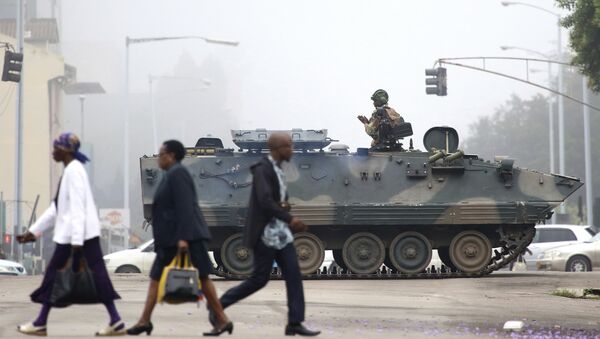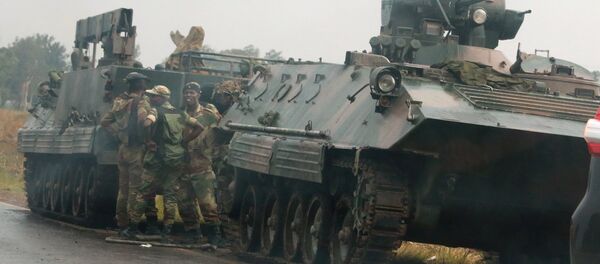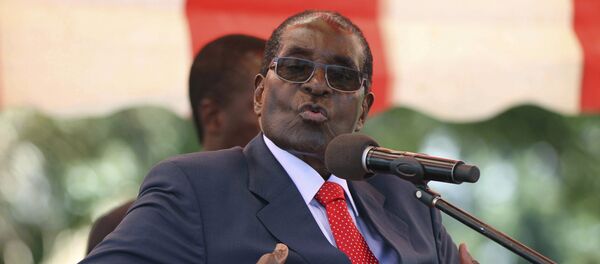Zimbabwe's military has read out a statement on the country's state-run media, ZBC, saying it has taken action to target criminals "committing crimes that are causing social and economic suffering in the country", claiming that there is no "military takeover of government" and that President Robert Mugabe is safe.
"As soon as we have accomplished our mission, we expect that the situation will return to normalcy," the army's statement said.
According to the statement, if the degenerating political, social and economic situation in the country is not addressed, it may lead to a "violent conflict," the Associated Press reported. The army also urged other security services to "cooperate for the good of our country," cautioning that provocations will be met with an appropriate response.
In Harare during the wee hours of the morning, it was reported that soldiers with the Zimbabwe Defense Forces (ZDF) had seized control of the state broadcasting outlet. The seizure was speculated to be part of a military coup against the government of long-time President of Zimbabwe Robert Mugabe.
Two employees of the Zimbabwe Broadcasting Corporation (ZBC), as well as a human rights worker, told the local Reuters bureau that soldiers occupied the state broadcasters' headquarters in the capital city.
The staffers claimed that the soldiers manhandled them as they took control of the office. However, they were also told that they "should not worry" as the soldiers were only there to "protect" the site.
Unconfirmed reports have poured in from Harare: dramatic claims of gunfights, at least three explosions in the streets, and Mugabe's house being surrounded and occupied by the military. Videos have surfaced of military vehicles, including tanks and trucks, blocking streets. Soldiers were also reportedly spotted loading ammunition into trucks. Confusion reigns in the capital, with few reputable reports thus far. The US embassy announced that they would be "minimally staffed and closed to the public" as a result of the uncertainty.
Citing "the uncertain situation" and "reports of unusual military activity" in Harare, the British embassy in Zimbabwe warned citizens to stay indoors "until the situation becomes clearer".
Due to ongoing uncertainty in Zimbabwe, the U.S. Embassy in Harare will be minimally staffed and closed to the public on November 15. Embassy personnel will continue to monitor the situation closely. @StateDept
— U.S. Embassy Harare (@usembassyharare) November 15, 2017
#BREAKING: #Zimbabwe military takes over State TV and surrounds President #Mugabe at his residence, heavily armed men seen surrounding his house just now
— Ni Njeru (@NjeruSamuel) November 14, 2017
— Prof Changamire (@1changamire) November 14, 2017
"Loud bangs" heard a moment ago in #Harare by a friend who is steadfast in insisting that speculation should not be reported as fact. "No answer from the phones at Zimbabwe Newspapers". Could be anything but "very weird nonetheless" #zimbabwe #Zimbabwecoup
— Peter Heath (@duenorthpr) November 14, 2017
#BREAKING: A column of tanks have entered the Central Business Distsrict of the #Zimbabwe capital, gunfire and heavy explosions heard in the north of the city
— News Breaker (@NewsBreaker101) November 14, 2017
Has there been a coup d'état in #Zimbabwe?
— The Jonathanian (@The_Jonathanian) November 15, 2017
Why these armoured tanks, explosions in Harare & take over of ZBC State Broadcasters by soldiers?pic.twitter.com/8rsG5EAxiC
On Tuesday, tanks were spotted in the outskirts of Harare. They were believed to be heading to the capital.
Earlier in November, Mugabe removed his vice president, Emmerson Mnangagwa, who had been a government minister for decades and a soldier during the nation's war for independence in the 1970s. Mnangagwa is popular with the military, and he was thought to be the most likely successor to the 93-year-old Mugabe. With Mnangagwa gone, the most likely successor to Mugabe is his 52-year-old wife, Grace. A power grab by Grace Mugabe is being widely discussed as a driving force behind the sudden military moves.
Mnangagwa has not appeared publicly since his removal.
On Monday, General Constantino Chiwenga, the commander of the Zimbabwe Defense Forces, vowed to "remind those behind the current treacherous shenanigans that, when it comes to matters of protecting our revolution, the military will not hesitate to step in."
Mugabe's party, the ruling Zimbabwe African National Union-Patriotic Front (ZANU-PF), replied to Chiwenga's statement by calling it "treasonous conduct on his part" that was "meant to incite insurrection and violent challenges to the Constitutional Order." They also criticized Chiwenga for involving himself in politics instead of sticking to military affairs.
"Such conduct stands unreservedly condemned not only in the party… but also in the [region] and the entire African continent where subversion of constitutional authority is… regarded as absolute anathema," read a statement from Simon Khaya-Moyo, the national secretary for information and publicity.
Zanu PF has spoken! pic.twitter.com/FuIBXP47Hq
— Prof Jonathan Moyo (@ProfJNMoyo) 14 ноября 2017 г.




